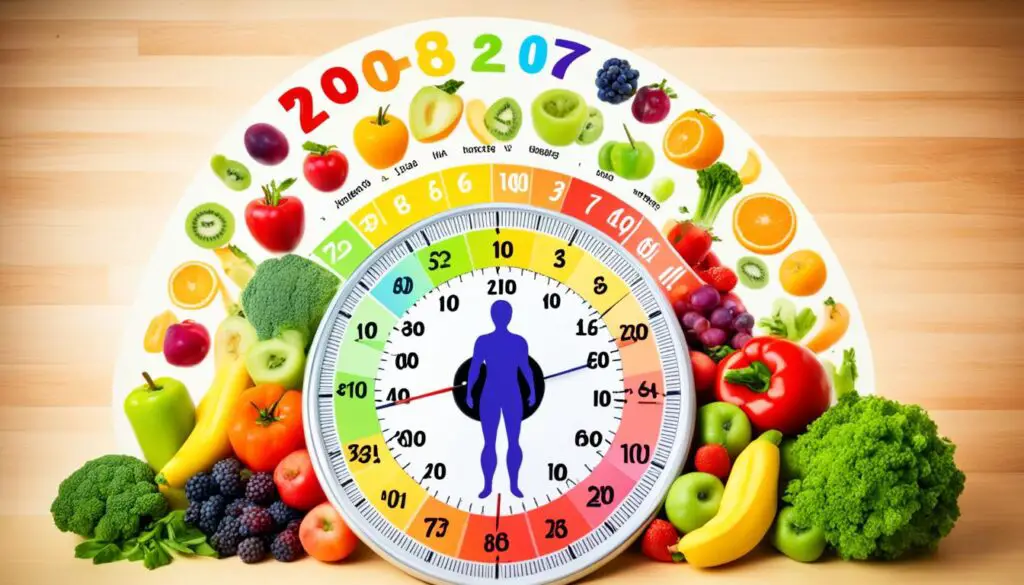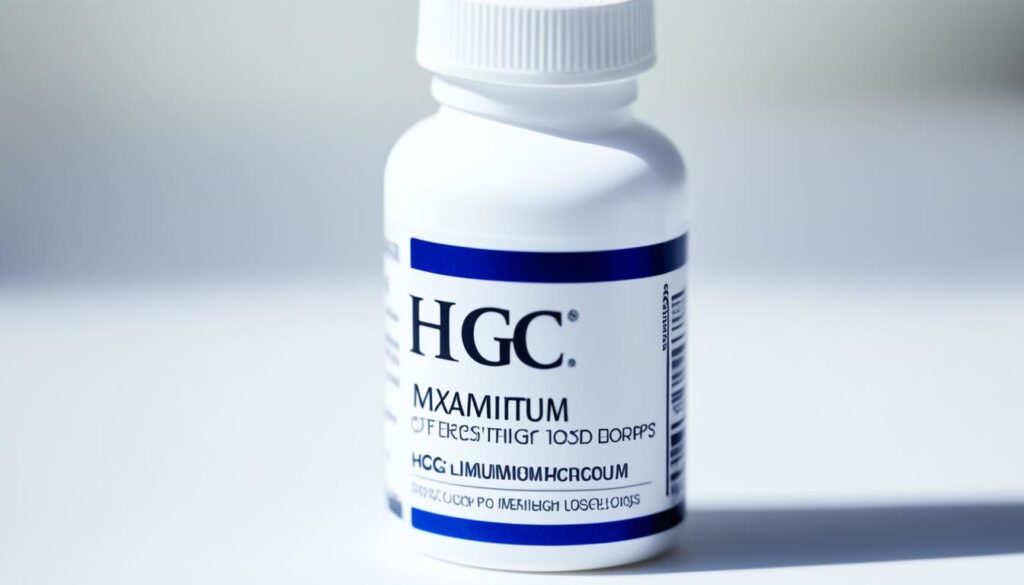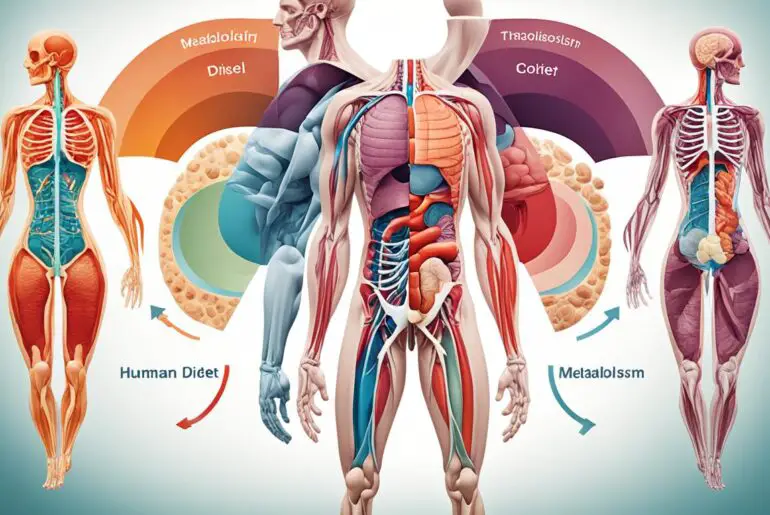Did you know that the HCG diet has gained popularity as a rapid weight loss solution with claims of boosting metabolism and aiding in hunger reduction? However, studies have shown that weight loss on the HCG diet is primarily due to drastic calorie restriction, and the HCG hormone itself has no significant impact on metabolism or hunger reduction.
If you’re considering the HCG diet, it’s important to understand the role of calorie restriction, the phases of the diet, potential safety concerns, and strategies for maintaining weight loss. By adopting sustainable strategies and incorporating exercise, you can optimize your weight loss journey and achieve long-term success.
Key Takeaways:
- The HCG hormone has no significant impact on metabolism or hunger reduction in the context of the HCG diet.
- Weight loss on the HCG diet is primarily due to drastic calorie restriction.
- Successful weight maintenance requires adopting healthy habits, incorporating exercise, and establishing a support system.
- Consulting with healthcare professionals or weight loss specialists can provide personalized guidance and support throughout the process.
- Long-term weight loss and maintenance are best achieved through balanced lifestyles and ongoing support.
Understanding the HCG Hormone
Exploring the Role of HCG Hormone in Weight Loss, Pregnancy, and Fertility
The HCG hormone, also known as human chorionic gonadotropin, is a vital protein-based hormone naturally produced in high levels during early pregnancy. Its main function is to support the healthy growth of the uterus and fetus by maintaining the production of other essential pregnancy hormones. Beyond pregnancy, HCG has been utilized to address fertility challenges in both men and women, aiding in the conception process.
However, it is important to note that elevated blood levels of HCG can also indicate the presence of certain types of cancer. As such, monitoring HCG levels is critical for both pregnancy and cancer screening purposes.
“The HCG hormone plays a crucial role in supporting a healthy pregnancy and fertility and can be used to address certain fertility challenges in both men and women.” – Dr. Sarah Johnson, OB-GYN Specialist
When it comes to weight loss, the HCG hormone is commonly administered through injections or other forms as part of the HCG diet. The diet involves a combination of calorie restriction and HCG hormone supplementation. While proponents of the diet claim that the HCG hormone aids in boosting metabolism and reducing hunger, scientific studies have demonstrated that the primary mechanism behind weight loss is the severe calorie restriction rather than the HCG hormone itself.
Despite its minimal direct impact on weight loss and metabolism, the HCG hormone continues to be a subject of interest and research in the realm of weight management due to its potential role in appetite regulation and fat redistribution.
If you’d like to learn more about the HCG diet and its impact on weight loss, pregnancy, and fertility, continue reading this comprehensive guide.
Throughout this article, we’ll explore the various aspects of the HCG hormone and its role in weight loss, pregnancy, and fertility. From understanding its physiological functions to debunking misconceptions surrounding its impact on weight loss, we aim to provide you with a well-rounded understanding of the HCG hormone and its implications.
Next up, in Section 3, we’ll delve into the crucial role of calorie restriction in weight loss on the HCG diet.
The Role of Calorie Restriction in Weight Loss

When it comes to weight loss on the hCG diet, the role of calorie restriction cannot be overstated. Numerous studies have shown that the drastic reduction in calorie intake is the primary driver of weight loss during this diet regimen. During the weight loss phase, individuals are limited to consuming only 500 calories per day.
This severe calorie restriction may lead to rapid weight loss, but it is important to note that it is not a sustainable approach in the long term. Such extreme calorie deprivation can result in muscle loss and metabolic slowdown, making it harder to maintain the achieved weight loss.
While the hCG hormone is often touted as a metabolism booster, research has shown that its impact on weight loss and metabolism is minimal. The main mechanism behind weight loss on the hCG diet is the significant calorie deficit that occurs through calorie restriction.
“Calorie restriction plays a central role in the hCG diet. By severely limiting calorie intake, the body is forced to tap into its stored fat reserves for energy, leading to weight loss,” says Dr. Sarah Johnson, a renowned nutrition expert.
While the hCG hormone may have some effects on hunger reduction, its contribution to weight loss is overshadowed by the overall calorie restriction. Therefore, it is crucial to focus on maintaining a nutrient-rich diet within an appropriate calorie range for long-term weight loss success.
Nutrition experts recommend a more balanced and sustainable approach to weight loss, emphasizing small calorie deficits and gradual weight loss. This allows the body to adjust more comfortably and minimizes the risk of muscle loss and metabolic slowdown associated with drastic calorie restrictions.
Benefits of Moderate Calorie Deficits:
- Preserves lean muscle mass
- Prevents metabolic slowdown
- Promotes sustainable weight loss
- Supports long-term weight maintenance
By focusing on healthy, incremental weight loss through moderate calorie deficits, individuals can achieve their weight loss goals without compromising their overall health and well-being.
It is important to consult with a healthcare professional or a registered dietitian before embarking on any weight loss program, including the hCG diet. They can provide personalized guidance and support to ensure that calorie restriction is done in a safe and effective manner, taking into consideration individual needs and health conditions.
Next, we will explore the different phases of the hCG diet and how they contribute to the overall weight loss journey.
The Phases of the HCG Diet
When embarking on the HCG diet, it is important to understand the different phases involved in the program. These phases are designed to optimize weight loss and support long-term weight maintenance, helping individuals achieve their weight loss goals effectively. The HCG diet typically consists of three key phases: the loading phase, the weight loss phase, and the maintenance phase.
The Loading Phase
The loading phase is the initial stage of the HCG diet and lasts for two days. During this phase, individuals are encouraged to consume high-fat, high-calorie foods to prepare their bodies for the calorie restriction that follows. This may include indulging in foods such as avocados, nuts, butter, and other fatty sources. The purpose of the loading phase is to help build up the body’s fat stores, which will be utilized during the subsequent weight loss phase.
The Weight Loss Phase
The weight loss phase is the most intense part of the HCG diet and typically lasts for a period of 3 to 6 weeks. During this phase, calorie intake is drastically restricted to just 500 calories per day. This calorie restriction, combined with the effects of the HCG hormone, helps the body burn stored fat for energy, leading to rapid weight loss. It is crucial to closely follow the prescribed guidelines and consume low-calorie, nutrient-dense foods such as lean proteins, vegetables, and fruits during this phase.
The Maintenance Phase
The maintenance phase is the final stage of the HCG diet and focuses on gradually increasing calorie intake while avoiding sugars and starches. This phase typically lasts for 3 weeks, but the duration may vary based on individual weight loss goals. The purpose of the maintenance phase is to stabilize the body’s metabolism and set a foundation for long-term weight maintenance. During this phase, it is important to reintroduce a wider variety of foods while practicing portion control and making healthy choices.
By progressing through these phases, individuals can maximize the effectiveness of the HCG diet and achieve their desired weight loss results. The loading phase prepares the body for the subsequent calorie restriction, while the weight loss phase triggers rapid fat burning. Finally, the maintenance phase establishes healthy habits and helps maintain the weight loss achieved during the program. It is crucial to consult with a healthcare professional or weight loss specialist for personalized guidance and support throughout the different phases of the HCG diet.
| Phase | Duration | Calorie Intake | Key Focus |
|---|---|---|---|
| Loading Phase | 2 days | High-calorie | Preparing the body for calorie restriction |
| Weight Loss Phase | 3 to 6 weeks | 500 calories per day | Triggering rapid fat burning |
| Maintenance Phase | 3 weeks | Gradual calorie increase | Establishing long-term weight maintenance |
Scam Products and Safety Concerns

When it comes to HCG diet products, it is essential to be aware of potential scams and safety concerns. Many products on the market claim to contain HCG but are labeled as homeopathic and do not actually contain the hormone. Only HCG injections, obtained through a doctor’s prescription, can raise blood levels of the hormone effectively.
Homeopathic HCG products are unregulated and may contain unknown ingredients, posing potential safety risks to consumers. It is important to exercise caution and avoid purchasing these unverified products. The Food and Drug Administration (FDA) has not approved HCG as a weight loss aid and questions the safety and efficacy of both the HCG diet and over-the-counter HCG products.
Reports of side effects from individuals on the HCG diet include headaches, depression, and fatigue. However, it’s important to note that these side effects may be primarily attributed to the low-calorie intake that accompanies the diet rather than the HCG hormone itself.
“Consumers need to be cautious when considering HCG diet products labeled as homeopathic. The lack of regulation and potential presence of unknown ingredients may pose safety risks.”
Safety Concerns with Homeopathic HCG Products
Homeopathic HCG products lack regulation, making it difficult to ascertain their composition and safety. Some of these products may contain fillers or unknown substances that can have unintended effects on the body. Without proper oversight, it is challenging to determine the potential risks associated with their consumption.
That is why it is imperative to consult with a healthcare professional before embarking on the HCG diet or using any HCG products. They can provide the necessary guidance and ensure your safety throughout the weight loss journey.
The FDA’s Stance on HCG Products
The FDA has not approved HCG as a weight loss aid, expressing concerns about its safety and effectiveness. This applies not only to the HCG diet itself but also to over-the-counter HCG products, including homeopathic versions.
It is essential to prioritize your health and well-being by opting for evidence-based weight loss strategies and consulting with healthcare professionals who can provide science-backed advice and guidance.
HCG Diet Products: Proceed with Caution
When considering HCG diet products, exercise caution and always prioritize safety. Below are some key points to keep in mind:
- Be wary of HCG products labeled as homeopathic, as they do not contain the actual hormone and may pose safety risks.
- Consult with a healthcare professional before starting the HCG diet or using any HCG products.
- Understand that the FDA has not approved HCG as a weight loss aid, raising concerns about its safety and effectiveness.
- Pay attention to any potential side effects and consult a healthcare professional if you experience any adverse reactions.
By prioritizing your safety and making informed decisions, you can navigate the realm of HCG diet products with confidence.
| Concerns | Recommendations |
|---|---|
| Homeopathic HCG products lack regulation | Avoid purchasing unregulated HCG products and consult with a healthcare professional for safe alternatives. |
| Potential presence of unknown ingredients | Choose HCG products obtained through a doctor’s prescription to ensure authenticity and safety. |
| The FDA has not approved HCG as a weight loss aid | Explore evidence-based weight loss strategies recommended by healthcare professionals. |
Strategies to Maintain Weight After the HCG Diet
After completing the HCG diet, it is important to implement strategies to maintain weight loss and prevent weight regain. Gradually increasing calorie intake after the diet, rather than making abrupt changes, can help avoid shocking the body and triggering weight gain. Reintroducing a balanced diet that includes sugars and starches in moderation can also help maintain weight. Additionally, incorporating regular exercise into the routine is crucial for long-term weight management and boosting metabolism.
Gradual Calorie Increase
One of the key strategies for maintaining weight after the HCG diet is to gradually increase calorie intake. Instead of immediately returning to pre-diet levels of calorie consumption, it is recommended to slowly and incrementally increase the number of calories consumed each day. This allows the body to adjust to the increased energy intake without causing sudden weight gain. It is important to monitor weight during this transition phase and make adjustments as necessary.
Balanced Diet
A balanced diet is essential for maintaining weight after the HCG diet. This includes incorporating a variety of food groups, including fruits, vegetables, whole grains, lean protein, and healthy fats. It is important to avoid extreme restrictions or completely eliminating any particular food group, as this can lead to nutrient deficiencies or intense cravings. Moderation is the key, and indulging in sugars and starches in moderation can be part of a balanced diet.
Regular Exercise Routine
Incorporating regular exercise into the post-HCG diet routine is crucial for maintaining weight loss and maximizing metabolism. Engaging in physical activity helps to burn calories, build lean muscle, and increase overall energy expenditure. Aim for at least 150 minutes of moderate-intensity aerobic exercise, such as brisk walking, cycling, or swimming, each week. Additionally, incorporating strength training exercises can help maintain muscle mass and boost metabolism.
| Strategies | Benefits |
|---|---|
| Gradually increasing calorie intake | Avoids shocking the body and prevents weight gain |
| Reintroducing a balanced diet | Maintains weight and prevents nutrient deficiencies |
| Incorporating regular exercise | Boosts metabolism and supports long-term weight management |
Importance of Exercise During the HCG Diet

While on the HCG diet, strenuous exercise is not recommended during the weight loss phase. However, incorporating exercise into your routine after completing the diet is crucial for maintaining weight loss and maximizing your metabolism. Regular physical activity can help boost your metabolism, prevent muscle loss, and support overall health and well-being.
When it comes to exercise during the HCG diet, moderation is key. Engaging in moderate-intensity exercises such as brisk walking, biking, or Zumba for at least 75 minutes per week can have significant benefits. These activities can help burn calories, improve cardiovascular health, and enhance muscle tone.
By including exercise in your post-diet routine, you can continue to support your weight loss goals and maintain a healthy metabolism. Regular physical activity helps to preserve lean muscle mass, which is important for sustaining long-term weight loss. Additionally, exercise contributes to overall fitness and can improve your mood and energy levels.
Remember to listen to your body and choose exercises that best suit your lifestyle and preferences. Discover activities that you enjoy and incorporate them into your routine. Whether it’s dancing, swimming, or practicing yoga, find what motivates you and keeps you active.
Exercise is a valuable component of an overall healthy lifestyle. By combining a balanced diet, regular physical activity, and proper rest, you can achieve sustainable weight loss, maintain your progress, and support a healthy metabolism.
Benefits of Exercise on the HCG Diet:
- Boosts metabolism
- Prevents muscle loss
- Burns calories
- Improves cardiovascular health
- Enhances muscle tone
- Supports long-term weight loss
- Improves mood and energy levels
Remember that incorporating exercise into your routine should be done gradually and in consultation with a healthcare professional. They can provide personalized guidance based on your specific needs and ensure that you exercise safely while on the HCG diet.
Avoiding Plateaus and Maintaining Progress

Plateaus, or periods of weight loss stalls, can occur during the HCG diet or during weight maintenance after the diet. It can be frustrating when progress seems to come to a halt, but there are strategies to overcome plateaus and continue making progress towards your weight loss goals.
Increasing Water Intake
One of the first plateau breakers to consider is increasing your water intake. Staying hydrated is crucial for optimal weight loss and overall health. Drinking an adequate amount of water can boost your metabolism and help combat water retention, which can be a factor in weight loss stalls.
Adjusting Calorie Intake or Macronutrient Ratios
Another way to break through a plateau is by adjusting your calorie intake or macronutrient ratios. Your body may have adapted to the previous calorie level or macronutrient distribution, causing a slowdown in weight loss. Consulting with a healthcare professional or weight loss specialist can help you determine the appropriate adjustments for your specific needs.
Reviewing Food Choices
Evaluating your food choices is important when faced with a weight loss stall. Take a closer look at your diet and identify any areas where there may be room for improvement. Consider incorporating more nutrient-dense foods, reducing processed or high-sugar foods, and ensuring you’re getting a balanced mix of proteins, carbohydrates, and healthy fats.
Regular Weigh-Ins and Body Measurements
Monitoring your progress through regular weigh-ins and body measurements is essential for identifying patterns and making necessary adjustments. This data can help you track your progress over time and provide insights into the effectiveness of different strategies you implement to overcome plateaus.
Seeking Guidance and Support
If you’re struggling with plateaus or have difficulty maintaining progress, don’t hesitate to seek guidance and support. Consulting with a healthcare professional or weight loss specialist can provide valuable insight and personalized recommendations to help you navigate through challenging periods. They can offer guidance on adjusting your diet and exercise routine, as well as provide additional resources and support.
| Plateau Breakers | Benefits |
|---|---|
| Increasing Water Intake | Boosts metabolism and reduces water retention |
| Adjusting Calorie Intake or Macronutrient Ratios | Overcomes adaptation and stimulates weight loss |
| Reviewing Food Choices | Improves nutrient intake and supports overall health |
| Regular Weigh-Ins and Body Measurements | Tracks progress and identifies trends |
| Seeking Guidance and Support | Provides personalized recommendations and motivation |
Transitioning to Long-Term Maintenance
Long-term weight maintenance requires adopting healthy lifestyle habits and making sustainable changes. It is important to continue monitoring calorie intake, incorporating physical activity, and choosing nutrient-dense foods. Establishing a support system, whether through a healthcare professional, a weight loss group, or personal networks, can provide accountability and motivation. Regular self-reflection and reassessment of goals can help ensure continued success in maintaining weight loss achieved through the HCG diet.
Conclusion
The HCG diet offers a way to achieve rapid weight loss through calorie restriction. However, it is important to note that the impact of the HCG hormone on metabolism and hunger reduction is minimal. To maximize metabolism on the HCG diet and achieve optimal weight loss, sustainable strategies must be implemented.
One key aspect is paying attention to calorie intake. During the maintenance phase, it is crucial to gradually increase calorie consumption to avoid shocking the body and triggering weight gain. Additionally, incorporating regular exercise into the routine helps to boost metabolism and maintain weight loss.
Ultimately, sustainable weight loss and maintenance are best achieved through the adoption of long-term healthy habits. This includes monitoring calorie intake, choosing nutrient-dense foods, and establishing a support system. Consulting with healthcare professionals and weight loss specialists can provide personalized guidance and support throughout the journey.
FAQ
Does the HCG hormone boost metabolism on the HCG diet?
No, studies have shown that weight loss on the HCG diet is primarily due to the drastic calorie restriction, rather than the impact of the HCG hormone on metabolism.
What is the HCG hormone?
The HCG hormone, or human chorionic gonadotropin, is a protein-based hormone that is produced in high levels during early pregnancy. It plays a role in supporting the healthy growth of the uterus and fetus, but its impact on weight loss and metabolism is minimal.
How does calorie restriction contribute to weight loss on the HCG diet?
The HCG diet involves consuming only 500 calories per day during the weight loss phase. This severe calorie restriction results in rapid weight loss, primarily due to a significant calorie deficit.
What are the different phases of the HCG diet?
The HCG diet typically includes three phases: the loading phase, where individuals consume high-fat, high-calorie foods; the weight loss phase, where calorie intake is restricted to 500 calories per day; and the maintenance phase, where calorie intake is gradually increased and sugars and starches are avoided.
Are homeopathic HCG products safe for the HCG diet?
Homeopathic HCG products are unregulated and may contain unknown ingredients, posing potential safety risks. Only injections of HCG obtained through a doctor’s prescription can raise blood levels of the hormone.
How can I maintain weight after completing the HCG diet?
It is important to implement strategies such as gradually increasing calorie intake, incorporating regular exercise, and adopting long-term healthy habits to maintain weight after completing the HCG diet.
Can I exercise during the weight loss phase of the HCG diet?
Strenuous exercise is not recommended during the weight loss phase of the HCG diet. However, incorporating moderate exercise, such as brisk walking or biking, after completing the diet is essential for maintaining weight loss and boosting metabolism.
What can I do to overcome plateaus or weight loss stalls on the HCG diet?
Increasing water intake, adjusting calorie intake or macronutrient ratios, reviewing food choices, and monitoring progress can help overcome plateaus or weight loss stalls on the HCG diet.
How can I transition to long-term maintenance after the HCG diet?
Transitioning to long-term maintenance involves adopting healthy lifestyle habits, making sustainable changes, and establishing a support system to help maintain weight loss achieved through the HCG diet.
What are the key takeaways for maximizing metabolism on the HCG diet?
While the HCG diet may offer short-term weight loss results, maximizing metabolism on the HCG diet requires attention to calorie intake, gradual calorie increases during maintenance, incorporation of exercise, and the adoption of long-term healthy habits.




